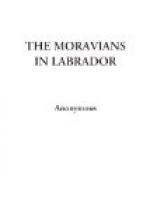Esquimaux visit the English settlements—pernicious
consequences—dreadful
accident—famine—unexpected supply
of
food and skins.—Emigration
from Okkak—missionaries’ care of the
wanderers, who return disappointed.—Terrible
tales from the
south.—Inquirers separated
from the heathen.—Popish priest
attempts to seduce the converts.—Brother
Rose inspects
Hopedale.—Karpik the
sorcerer.—Peter’s fall.—Visits
to the
south renewed.—Parting
address of the
brethren.—Epidemic.—Death
of Daniel—of Esther.—Conversion
and
peaceful end of Tuglavina.—Last
days of Mikak.—Indians come to
Hopedale.—Rose’s
remarks on the internal state of the
missions.—Instances of
the power of grace among the
Esquimaux—striking observation
of one of the
baptized.—Jonathan’s
letter to the Greenlanders.—Affecting
confession of Solomon.—Conduct
of a young woman sought in
marriage by a heathen.—State
of the settlements at the close of
the century.—Prospects
begin to brighten.—Remarkable
phenomenon.—Avocations
of the missionaries—their
trials—preservation of
their vessels—of their
settlements—their brotherly
love.
Eleven years had the brethren now laboured for the conversion of the Esquimaux amidst many difficulties and dangers, when circumstances occurred which threatened to blast these fair hopes of success. In the summer of 1782, the Esquimaux, for the first time since missionaries had settled in the country, visited the English settlements in the south. Tuglavina had persuaded Abraham, one of the baptized of Nain, to go with him to Chateau Bay; and when they returned in October, they reported that the Commander-in-chief had been quite overjoyed to see baptized Esquimaux, and wished that more of them might come to visit him, for he also had been baptized, and hoped that his soul after death would go to heaven. He had reproved Mikak for not being baptized, and warned then all against murders and adultery. Abraham had bought a boat and still owed half of the price, yet he and Tuglavina had each received a present of a musket and powder and ball, nor had the women been sent empty away; also, while they were there, they had had plenty to eat, a gratification of no minor importance.
By these splendid accounts of their kind reception, a general desire was excited among their countrymen to go likewise to the south; and the next consequence was, insolence and opposition to the missionaries and teachers. If they were reminded to be sparing of their winter provisions, they sarcastically replied, by reminding the brethren of the manner in which Tuglavina and Abraham had been treated by the “good” Europeans in the south; or if they came into the mission-house and got nothing to eat, they immediately exclaimed, with the Europeans in the south we can have plenty to eat. And when one was turned out from the




